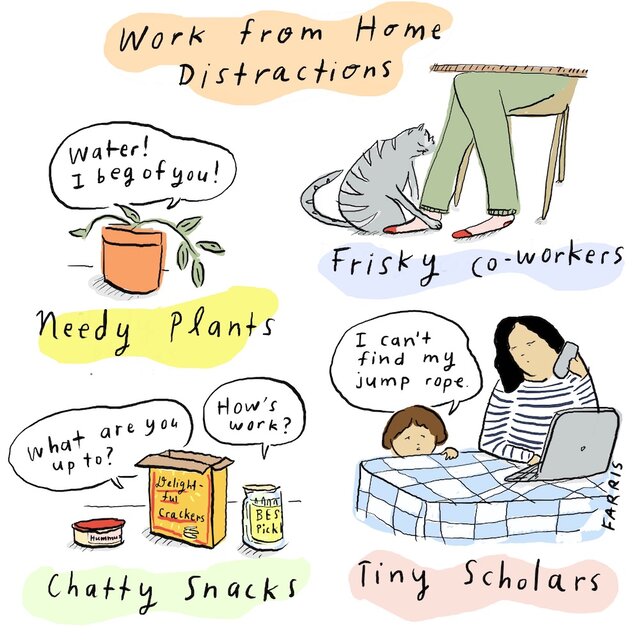The pandemic has fundamentally shifted the way in which people work. Even after more than a year since it strikes, some of us are still getting our job done at home. In other words, the working from home trend is not going away anytime soon.
You can work conveniently in your pajamas all day, no worrying about getting ready and getting dressed up, no long commute, no rigid schedules, and you can even roll out of bed five minutes before work starts.
Ah, the joys from working from home…
It’s all fun and games – until a certain point, you find yourself exhausted. You feel so tired of all of it but you do not understand why. After all, all you do is just simply sitting in online meetings, grabbing your favorite snacks for your own pantry, and just getting your tasks done as usual like what you do in the office, right? So, what gives?
It turns out, there’s actual logic behind it. Besides all of the advantages, working from home can actually drain you out – even worse than working in the office. We call it working from home burnout.
According to a survey conducted by Monster, more than two-thirds (69%) of employees in the U.S are experiencing burnout symptoms while working from home.
So, if you’re one of them, we have some essential best practices you can follow to avoid being pulled into a state of WFH burnout.
Why Working From Home Is So Exhausting
As we enter 2021, many of us are realizing that working from home isn’t all sunshine and rainbows. Some of you might even think that it’s not the career utopia you had imagined. Here’s why:
A Lot of Distractions
If you work in the office, it’s easier for you to turn off your home brain and focus on the job you have to work on that day. The office vibe and peer pressure just motivate you to get your work done.
Meanwhile, when you work from home, you have both work and home chores swirling together. And it’s always challenging to get yourself into the work mode.
Those dirty laundry and dishes that are waiting to get cleaned, a new episode of your favorite TV shows, the dog that just wants to be petted and played with, your social media accounts, and the couch feel too cozy too.

So, we can agree that working from home increases the blurred lines between your work and personal lives.
It’s Not Actually Your Choice
If you think about it, you’ve actually never asked for all of these, right? The COVID-19 happened and you’ve been sent home and asked to work remotely. Everyone was just in emergency mode. In fact, the key to good mental health is autonomy, self-expression, and a sense of control.
And since you’re not really all prepared (especially mentally) for this, it can be frustrating and exhausting at some point. It’s hard to keep going and shut off the rest of the ‘outer’ world all of the sudden just to get your tasks done.
You Miss Your Co-Workers
Another reason why working from home is so daunting is a little self-compassion. You miss gathering around in front of a whiteboard in the meeting room discussing your next content campaigns or explainer videos production budgets all together in person. Or those water cooler chit-chat and coffee break talks.
Working from home limits social interactions. You might also need an extra effort to connect with your teammates through group chat or video calls.
Even for introverts, human interactions can help improve the work experience. So, you’re most likely burned out because you lack the desired connection with your peers and are not energized by their presence.
The Workload Just Keep Increasing
For many of us, work from home means an extra workload. While you need an extra effort to stay productive, your workload just keeps adding up. It’s a time where many things are being thrown at us at once on a daily basis.
More than 60% of employees say that their workload has significantly increased since they work from home. Not to mention that you are also being “always-on” since there’s no rigid work schedule. It’s easy to feel flat-out stressed and overwhelmed.
Many companies are also struggling to compensate for extra productive hours put in by their employees during work from home and give them more options to turn down additional work.
How to Combat Work From Home Burnout
Frequent back pain, headaches, dramatic change in sleep patterns are some of the health issues caused by heavy work from the home workload. This, in turn, can lead to burnout. And when employees are burned out, it can lower retention rates, engagement, and work performance that can harm the company itself.
The key here is to fix the problems by addressing the root causes and do not simply treat the symptoms. Here are some fixes you and your company can do to avoid massive exhaustion and improve productivity seamlessly.
#1. Set Boundaries and Limits
Even if working from home provides you with more flexibility in work hours, it doesn’t mean that you have to be available 24/7 to get your work done, reply to emails and chats, have a video conference, and more. It’s just going to drain your mental energy faster. After all, you’re a human and not some type of superhero.
I get it. For employees that are struggling to separate their work and personal lives, they feel like they have to work all the time to signal their loyalty, devotion, and productivity. But, you don’t have to be so hard on yourself.
Always make sure you set your working hours and let co-workers and HR managers know about it. This way, they understand, when you’re free to be called to discuss the project, virtual meetings, and more. They also know when they should expect a fast response from you.
#2. Create Your Comfortable Yet Effective Working Space
Getting your work done in your bed is a bad idea. It’s too comfortable and your brain simply will not be ready for it. Therefore, you need to set not just a comfortable, but also effective working space.
Find a space where you can’t easily relax so you can focus on your work. Nope. You don’t have to redecorate your room or buy new desks just to get the luxury of dedicated office space.
Even a small corner in your kitchen or back yard should work just fine – as long as it puts you in the work mode and eliminates the distractions.
#3. Don’t Use Too Many Communication Tools
Communication and project management tools come in handy for remote work. It helps employees get the project done, stay on the same page, and never miss a deadline.
That being said, every communication tool comes with its own notification. That means more tools create more noises. The more tools you have, the more information will you get and it can be too hard just to keep up with all of them.
Most of your workday will be spent only signing in and out of tools and switching apps and browser windows. In this case, make sure to only use tools that you and your team really need and can’t really get any project done without them.
#4. Get Up for a Quick Walk
When working at the office, your co-workers will ask you to join them to grab a cup of coffee or lunch. You get up from your desk and have a quick walk and fresh air for a break. Walking can help you reset your mind for a moment and alleviate stress.
However, when you’re too focused on your work at home, sometimes you forget to move. Make sure you allow yourself enough time to take a break.
Whether you take a walk around the house or if you can walk around your block or to a nearby park for a couple of minutes, this helps create effective breaks within your workday.

#5. Virtual Meetings Can Be a Lot More Fun
While you can’t go for coffee breaks together with your co-workers at your favorite coffee shop, why don’t you have it at Zoom or any other video conferencing platform you’re using?
Video conferencing should not be all about work and projects. It can be more fun by catching up with everyone’s well-being and condition. It makes you more connected with your virtual teams and feels less isolated or cut-off.
You can do some fun team-building activities through video conferencing, such as pub trivia, mini dance party, quick workout, or just simply having a casual conversation just like you and your co-workers usually do in break time at the office.
Maintain Your Well Being While Working From Home
The negatives of the transition to working from home have outweighed the benefits. You’ve been doing it for more than a year and exhaustion is taking its toll. Even some professional remote workers still find it challenging to stay productive and maintain their own well-being after working from home for years.
Working from home burnout is real, very real. With those five tips mentioned above, you know what to fix so you can get your tasks done, maintain your overall health, and thereby avoid burnout in the long run.


